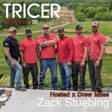Introduction to Tricer Podcast and McMillan Stocks
00:00:01
Speaker
You are listening to the Tricer podcast, where we talk all things hunting, gear, and the great outdoors. Before we begin, let's start things out right and put God first. Lord Jesus, I thank you for Tricer, and I ask that you can use this podcast as a way to bring joy to all of our listeners.
00:00:17
Speaker
We lay Tricer and this podcast at your feet. Amen. All right. I'm excited for this one because i have been using McMillan stocks for a very long time. i think my first custom rifle was like 12 years ago or something. It was McMillan stock.
00:00:34
Speaker
um I actually have a McMillan action because i used to make McMillan actions back in the day. i have one of those on one of my guns. i Just a really big fan of McMillan and pretty much like the godfathers of, you know,
00:00:46
Speaker
custom rifle stocks in the industry. I mean, they are they are the cat's meow when it comes to that. And I reached out to McMillan. We've been doing some stuff together with some collaborative, you know, running our tripods and running some of their
Interview with Eric Stecker from McMillan
00:00:56
Speaker
stocks. And ah really excited to have Eric Stecker on today to kind of talk about the brand, where you guys have been, where you've been going. eric how are you doing?
00:01:04
Speaker
I'm doing great, Drew. How are you? um I'm doing great, dude. I'm on a day 27 of Hawaii right now.
Personal Experiences and Hunting Stories
00:01:10
Speaker
So I've got, i go home tomorrow and then i leave for Africa on Monday for 14 or 12 days to go hunting with a bunch of brands. So I'm a Hawaii's rough, man. Yeah. I've been, uh, it's kind of nice because i've been I was traveling so much. I know it sounds like this is traveling, but I've just been gone every single week, once or twice a week flying out, you know, and it's never home with my kids. And so being in Hawaii,
00:01:33
Speaker
I've honestly done more tricer work. Like I won't leave. I'm doing four podcasts today. Yesterday i was here all day. We had this whole tariff thing going on mid, mid Hawaii too, which makes it really fun for us.
00:01:45
Speaker
But ah I've just been working a ton and just getting a lot of stuff done being in one place, not being able to leave, you know, not be able to fly to trade shows, not be to fly to Texas or whatever. So it's been nice. I got to use the bow a little bit.
00:01:56
Speaker
My kid got his first bow kill, killed a goat. I killed some sheep, killed some sheep, killed some goats. I hunted nowhere near as much as I thought I was going to hunt. Uh, was gonna be hunting like, you know, three days a week. i ended up hunting like one day a week.
00:02:09
Speaker
Um, but it was, it was still fun. It was a good time. And yeah, man, we're on the big Island. Yeah. It's like the big Island's a redneck paradise, man. You can hunt here at three 65. I'm going to come back in June. My kids at YWAM youth with a mission. It's a like a um missionary school, Christian school. So he's he was there for three months and now he's in Kyrgyzstan.
00:02:29
Speaker
So he graduates in June. going come back in June and I've been going to church over here. So one that the, couple of the pastors are like wearing kuyu. So im like we went to the beach together and we came friends and I'm going to go hunt wild, ah wild cattle with them in June.
00:02:42
Speaker
And wild cattle Hawaii? Wild cattle in Hawaii, dude. And he says, he said he's been treed three times. oh my god he says they are i'm like bring my bow and he's like no you can't bring your bow he's like they are the most violent animals ever so i'm flying back over here in uh in june and i'm gonna go hunt with this guy denny and we're gonna go uh go chase some cattle but it's been cool being over here and just it's just it's a really cool like hunting vibe on this island it's very much like uh like kind of like a redneck paradise. Like, mean, that's the way i can describe it. Right. Like when you're here, you you know, most of these guys have guns and bows and they go hunting, you know, they'll be sitting there. was going go and kill something. They go out on the hills, kill something, come back. You know, like it's, you pretty much hunt the whole Island.
00:03:26
Speaker
Um, there's definitely some tricks or like navigating the boundaries. I think a lot of people on the Island don't really wreck. They don't use on X. It's kind of hunt wherever they want. And I'm like, kind of like, well, no, I'm not going I can't hunt. They're like, Oh, go hunt there. I'm like,
00:03:38
Speaker
that's private land. Like, Oh, no one cares. I'm like, I can't, I can't, I own a company. The last thing I need is get in trouble for, they're like, no, we've been doing it for 40 years. Who cares? He's going there. You know, there's definitely some weird stuff like that. You got navigate and kind of figure out like the seasons and stuff. And they, their rules are very like, they're not lax. They're just like very vague. You got to really kind of figure out like, you know,
00:03:58
Speaker
where you're hunting and when you're hunting and you call people and they're like, Oh, no you can hunt that units open. I go hunt the unit and the guy talked to warden. He's like, no, only the South part of units open. Well, it's like, well, nowhere says that, you know, so there's some, there's definitely some tricks to it, but it could be done. And I think local knowledge, talking to lot of local guys really helps with that, you know? And, uh, man, I'm, I'm going to come back every year for at least a month. And it's been a month over here with the family and and do this. It's awesome.
00:04:21
Speaker
Well, I had the good fortune once to hunt in New Zealand because we were doing ah i was with Burger Bullets at the time and we were doing a bullet test and we needed to get a bunch of animals in New Zealand.
00:04:32
Speaker
Their goats and their wallabies and and there's there's a number of animals that you could shoot as many as you can see because there aren't any predators on New Zealand islands. Is that the case in Hawaii? i'm I'm trying to think back. It's pretty darn near It's pretty darn near. It's like three goats a day.
00:04:49
Speaker
um the sheep are a little more, the sheep's like one, it depends on where you're hunting. Some places it's wide open all year round. Uh, some units are open like by us, like is open all year round for for rifles as well. A lot of units are only bow hunting.
00:05:03
Speaker
Um, I mean, the goats are pretty dumb, man. Like if you had a rifle, you could just sit there and just smoke goats. It would be, it almost wouldn't even be fun, you know? But ah yeah, it just depends on where you are. And then obviously on private land, it's open year round as well. Right. Like, cause I went to Maui in August and you can kill 30 access here in a weekend.
00:05:22
Speaker
that'd be a phenomenal place to go. If I had a bullet company, you go test, test bullets is down there, you know, and, and do that for sure. I got 82 animals on that trip to New Zealand. Oh, no way.
00:05:35
Speaker
who Seven days. So what was that? That would probably be like what you were run, like the hybrid hunter or something or. Yeah, actually we were testing, we were testing out the classic because the, one of the things when, when Berger first started making bullets that were used for hunting They were actually the target bullets. We didn't make a specialty built hunting bullet.
00:05:56
Speaker
We were told by people who used it in the field, how, how much they liked it. episode But the, the thing that was most popular was like the VLDs or bullets that were able to maintain the velocity with, ah with a ah higher BC sharper points.
00:06:14
Speaker
Well, we wanted to experiment and see if we made a bullet that had more of a, like a 168 grain Sierra, you know, more of a tangent ogive. It isn't quite so, it doesn't have quite that sleek profile.
00:06:26
Speaker
We wanted to see what would happen. Well, of course we tested it quite a lot in media and it had basically the same performance because since we didn't design the bullet purposefully to be a hunting bullet, um we didn't know why it did, it does what it does.
00:06:40
Speaker
And so we didn't know if that thing with, if changing the ogive profile was going to affect that. And so we took this tangential jive, fairly plain looking bullet over to New Zealand after we did a lot of testing in media, just to make sure that it had the the killing power of the other bullets or we weren't going to introduce it.
00:06:58
Speaker
And so that's, that's why we went. So we went with 200 rounds, you know, yeah different people had to bring it in their suitcases and 200 rounds and actually Kelly McMillan let us borrow one of his, it was 30 six.
00:07:13
Speaker
And or no, so um excuse me, it was 300-win mag, 300-win mag. And without a muzzle brake, by the way. waiting I want to say weighed about seven pounds. It super light, six, seven pounds. It was super light gun. Really fun to shoot.
00:07:27
Speaker
Oh, yeah. Beat the pieces out of me. Matter of fact, is so and I admit this in an article, some of those shots were taken by the guy was with because it was a hammer. And it was it was getting me pretty good. so But we've had a great time.
00:07:39
Speaker
Had a great time. And proved out the bullets that the bullets work. Oh, they definitely they definitely kill stuff. That's for sure. And it is kind of cool.
Eric Stecker's Career and Industry Insights
00:07:47
Speaker
Like, obviously, this is a Macmillan podcast we're going to do, but you do have a background. I mean, you are part owner of Berger Bullets. you You have your hands in defiance actions. I mean, like you, Macmillan employs people who know what they're doing and understands the gun industry, understands accuracy. Mm-hmm.
00:08:05
Speaker
Yeah, I was very fortunate in my career. I met Walt Berger when I was young. I was actually dating his granddaughter, one of his granddaughters, and met him when I was very young. I started working for him out of high school and I i loved it.
00:08:20
Speaker
I understood it. um if Everything clicked. And within a short period of time, I was you know shop supervisor, plant manager and all that kind of stuff. And so I i became the person who worked with Walt to get that going well.
00:08:34
Speaker
Burger Bullets has sold four or five times over its history. And there was a little gap there where I wasn't involved because the owner took it moved it to California. But then I got back involved when another owner got and got into the picture. And so there's about a one and a half year gap.
00:08:49
Speaker
But over that 30 years, you know, I was the, I've ended up being the president of Burger. And ah because it was in California for me to move to California, they allowed me to buy a portion of interest in the company. So I was was also one of the owners.
00:09:04
Speaker
And that was a fantastic experience. You know, eventually we sold Denamo and, you know, the story is boring, but, you know, it it was smart. It was a good idea for me to part ways when somebody else took the keys.
00:09:16
Speaker
And, you know, then I really didn't have a lot to do after that. And, you know, I so make the joke that I wandered the earth like Kwaai Chang Kang. A friend of mine talked about doing that in his career. And I always thought that was a cool thing to do. But after, you know, about a two years, i I was excessively bored, was sort of getting in a dark place as a result. It was not a pleasant thing. And so I just wanted something to do. And I reached out. Kelly McMillan happened to have something on Facebook that said they were looking for some help. And I knew Kelly. So I called him up and he said, hey you need any help? And
00:09:54
Speaker
He's like, sure come on down. And I started up with Kelly and within a few months, my coming to McMillan sort of rekindled a conversation. Well, it was always ongoing, but it added a little bit of significance to a conversation that Kelly was having with Bob Beck.
00:10:12
Speaker
And that all sort of turned into a situation where Kelly was ready to sell and Bob was ready to buy. And they had been long friends. You know we actually all sort of worked together. Bob was a guy that we used to promote Burger Bullets and McMillan did as well.
00:10:28
Speaker
So, I mean, i've I've been to trade shows with Kelly. You know, we've we've had this sort of working relationship for a long time. Indirectly, you know, we stayed in our own lanes, but we had this working relationship. So when it came together, it made sense for it to sort of transition into the future. And so I stayed on and Bob picked up McMillan. And then a few years later, he added Defiance to our group.
00:10:51
Speaker
And so, yeah, it's it's been interesting. I got to tell you, the difference between being a bullet guy and being a stock action guy, I mean, worlds apart.
00:11:03
Speaker
Worlds apart. Really? Oh, gosh. I mean, bullets. I could tell you almost I could tell you down to the bullet what you needed. If you gave me your twist rate, your cartridge and what you were gonna do with I know where you're going with this. i could go right there. Bam.
00:11:17
Speaker
You're right there. you go with this yeah Oh my gosh. I go into stocks. And now admittedly, as a bullet guy, a, as a fairly passionate bullet guy, my primary interest was basically everything from the firing pin forward.
00:11:32
Speaker
You know, that's my whole world was internal ballistics, firing pin and external ballistics, but that was my whole world. And so I assumed a lot about stocks and actions and all that kind of stuff. You know, certainly I had my own collection, but my my love and passion was for the projectiles.
00:11:49
Speaker
Well, I go getting into stocks and oh, my gosh, um the chaos ah that is the stock to action, to barrel, to trigger, to accessories.
00:12:07
Speaker
meshing those all together into a single platform. The chaos that exists in that world is is pretty tremendous. And I think it's fair to describe it as chaos because ah thank goodness for Remington, because if it weren't for the Remington 700 clone, you know, we'd all be scratching our our our butts and winding our watch, you know, so it's it's our scratching our watch and winding our butts. the the The fact that there is that Remington clone sort of,
00:12:36
Speaker
unifying notion. And even that is, is almost a bit ridiculous because the only thing that's really consistent between Remington clones is the screw spacing and the shape and the tang. That's about it. Yeah.
00:12:48
Speaker
Ports are different. Bolt handles are different. I mean, there are even, uh, lugs that are in different positions on some Remington clones. Um, so it's, uh, the bolt releases, you know, all that stuff is totally different.
00:13:01
Speaker
And so, And that's just the Remington clones. Then you have the Mausers and the Rugers and, you know, all the various different. oh and they and they all have their own, they all know how to do it right. And I'm not even, I'm not even faulting them for that. Everybody's got their own engineers, there no right their own ideas, but there's no a cohesive collaboration at all.
00:13:23
Speaker
And so every time somebody comes up with something new, we basically have to either recreate a new stock or, or figure out how it fits into an existing stock. And for Macmillan, it was particularly interesting.
00:13:37
Speaker
And now admittedly, I haven't spent any time working with any of the other stock brands, but I know Macmillan has been around quite a long time and they've been making stocks for these rifles and all these different configurations for five decades.
00:13:51
Speaker
And so, I mean, we've got nearly 200 molds that are for stocks that we might only hear somebody interested, maybe getting one or two of those a year, because that's how long those rifles have been around, you know, and we made stocks for them back then.
00:14:08
Speaker
And so now as, as you get into the more modern day and folks want a new, more modern stock, um, we're doing that too, but we've got a huge catalog of, um, different Winchester stocks and, you know, well, Mousers lot of it. So well I'll get into that a bit later, but,
00:14:25
Speaker
um So yeah, it was really a challenge to go from a bullet world that was, in my mind, simple to a ah stock and action world that is far more complex.
00:14:37
Speaker
Yeah. And I think it's important for people to realize how important the stock is. And yes, you could go buy a, gosh, what's that brand? Magpul stock, right? And it's going to be this polymer stock that'll kind of fit every Ruger American at the store, right? Or every 700 action.
00:14:55
Speaker
But it's nowhere near the same as what you're getting when you buy McMillan stock. Because McMillan stock is literally, it goes it doesn't start from the stock up. It starts from the action down. And it's whatever you have, bottom metal, action, barrel, it is specifically made, inleted to your...
00:15:16
Speaker
two-year gun, right? Oh, right, yeah. Yeah. You know, and one thing to your detriment now, because I know a lot, there's a lot of new guys, i mean, there are lot of people trying to do stocks now, right?
00:15:27
Speaker
And they have like two stocks. McMillan, to their detriment, has been around for 50 years. Man, when you go to pick a stock out, it's a, I mean, I can't imagine your customer service calls, like just trying to figure out which one do I want?
00:15:39
Speaker
And so many of them are so close. You know what I mean? You're like, Oh, I want the game scout or I want the game warden? Do I want the, like you're looking at them and it's, uh, you guys have like the most options in the industry to, to build a custom gun, you know?
00:15:53
Speaker
Yeah. And it, it actually, um, it's, it's a real, it's a real challenge and, uh, excuse me, it's a real challenge. And, it's a, it's been such a challenge that, um,
00:16:04
Speaker
we're that's one of the things that I want to do address. And I want to share is the fact that one of the reasons why we put so many stocks on our online store is because we want to address those folks that but I'll take what, how, whatever configuration it's in.
00:16:21
Speaker
See that, you know, I'll back up just real quickly, you know, Gail McMillan, when he started making stocks a long time ago, he was a bench rest shooter and bench rest shooting. The competition has the,
00:16:32
Speaker
the tightest requirements for success out of all competitions. You know, you got to get sub quarter minute and I've been to matches where to win it, you had to be sub eighth minute. And that's over 20 targets over, you know, two days. So that's a lot of shooting to stay at that sub quarter minute of angle.
00:16:48
Speaker
um And so that it's a very demanding discipline. And so he came from that world. And the thing about bench rest shooters back then is ah Highly customizable. Now, today, bench rest shooting is basically fallen into the six PPC rut and everything's the same.
00:17:08
Speaker
But there was a time when it was extremely innovative and they were doing all kinds of really cool new things. And so the idea was- Which is kind of neat. I'm sorry for cutting you off. you came for a burger yeah You came from Burger, who at the same time, Old Man Burger is doing the same thing.
00:17:21
Speaker
On the Bolt side, yeah. On the Bolt side. So in Arizona, so these guys are both at the same time pioneers. McMillan and Berger are pioneers where we are today. I mean, like, we wouldn't have high CBC bolts it wasn't for what McMillan and Berger were doing back in the day. Like, these guys are, like, wildcat and figuring it out. Like, it wasn't like, oh, we use a 6mm. It was like, well, what can we do with 308? Okay, what if we went to here? What if we do the 25.6? Like, so I'm i'm sorry for cutting you off, but like but, like, these guys, like, Gale McMillan,
00:17:49
Speaker
and I can't remember the burgers name. Gosh, burger walt berger i i want an old man burger so I'm going to say, well, burger were pioneers in this, in the sport and bringing about this thing. So keep going. I'm sorry to guys.
00:18:02
Speaker
Well, no, but but that that plays right into the point. So like, I mean, and it's, um it's hard for some people to understand because they don't understand like what's behind the curtain to do all this. But the point I'm trying to make is so in burger bullets,
00:18:18
Speaker
At one point, Berger bullets had like 11 different 17 caliber bullets you could choose from.
McMillan's Stock Designs and Customization
00:18:26
Speaker
Now, first of all, 17 caliber, not one of the most popular cartridges, not one of the most popular calibers.
00:18:32
Speaker
um And we had everything from a 13 grain clear up to a 37 grain VLD. I mean, we went the whole gamut. Now, the reason why that's unusual or why I'm saying that that's strange and why that happened was because Walt Berger was a bench rest shooter.
00:18:49
Speaker
Boy, if you know, if a two 64 next, not right, then a two 63 five ought to do it, you know? And so if a 15 grain bullet isn't right, then an 18 grain ought to do it. And so his brain always goes to, well, you got to dial it into the finest, um, the finest detail to get it the best possible performance that you could possibly get.
00:19:09
Speaker
Well, Gail was cut from the same cloth. So they had all these options and all these tweaks. And so every time, Somebody came to him and said, oh, we want to try this and it's different.
00:19:19
Speaker
He didn't just take the existing stuff and hollow it out so it was universal and make it work, you know, sort of try to force it in there. He invented a completely new thing for it. And so that kind of that approach has just grown and grown and grown.
00:19:35
Speaker
And so that that happened with Burger 2. And so over time, I was a part of having to cut back on the offerings in the different calibers because the origins of the company were so based in having so much variety because you needed it. Not because they weren't trying to take money out of people's pockets.
00:19:52
Speaker
They believed that somebody would benefit from the difference between a 15 grain bullet and an 18 grain bullet. Just like Gail believed there would be a benefit between having your port cut at a specific place because that's where your port is and your barrel cut. So it's really tight and your stock to be made specifically to fit, to work with what you're doing.
00:20:12
Speaker
ah One quick example is there's a across the course, Palmer rifle, Palmer stock that we don't make too much anymore, but they actually designed it to have an offset because that's, that's one of those offhand rifles that they shoot, you know, high power, long distance.
00:20:26
Speaker
Well, they actually designed it to have an offset on purpose. So, because that's how people held it and it benefited the shooter that way. So my point is every stock was a specific design to,
00:20:39
Speaker
maximize what that potential shooter might be going through. Now to to get back to what we were talking about. So it's created quite a, quite a challenge for us because, you know, today's Amazon world, people want to, they want to look at what they want and tell me that that's the one I want and then I'll take it.
00:20:56
Speaker
So to address that, that's what we have the online store for. So we have all of our many, many stocks to 200. We've got a sold out of a bunch of them lately, but we're getting to put like more of them on there.
00:21:08
Speaker
But those stocks are done. And so as long as you know what you have, you can go to those stocks and pick one that's ready to go. On the custom side, there's 17 different points that we have to get from the shooter to make sure that their stock is right.
00:21:24
Speaker
And by right, you know, we're talking about tailor fitting the port the port area, tailor fitting the bolt notch. yeah we have bolt notches that are tighter to the bolts because if you have a a Remington bolt, or you have like a Defiance has a bolt, or you have a certain sweep, we actually make the the bolt notch for that specific bolt. You know, so we, everything's really tight and specific.
00:21:49
Speaker
Now, one of the things that we realized over the years is people were asking for, well, but what if I want to switch out my barreled action? You know, now I can't use this and all this kind of stuff. So we do also have, or have recently started making what are called universals, like, like this one right here.
00:22:07
Speaker
behind me. um This is a ah variation on the A5. So the A5 is the big stock that, you know Chris Kyle used and it it was in the military used by snipers. It's not the, this is the M40A1. This was the original stock that McMillan made for the military for the sniper rifles, the first sniper rifle with a synthetic, thin-setting stock, excuse me.
00:22:31
Speaker
But this one, This was the A5 and the A5 was very specific. It was a tactical stock, a sniper stock. And with people saying, you know, I've got this barreled action, that barreled action, the popularity of chassis, you know, when when Gail McMillan started making stocks, there weren't chassis. So that wasn't even really a discussion.
00:22:50
Speaker
But people were saying we want something that has more versatility, be able to swap out barreled actions. And that's where these universals came in. So this is the u one this particular stock.
00:23:01
Speaker
And it's made with a universal inlet. It's got a universal barrel channel. So you can anything up to an MTU will fit. And so we've we've done those things to address those concerns.
00:23:13
Speaker
But that's one of the challenges we face with Macmillan is um some folks will say, well, we're old school. You know, we make everything basically like Remington Sendero's. Well, it's it's just not it's basically fake news. It's just not the truth.
00:23:28
Speaker
We do make more modern stuff, but yeah, we absolutely have a very large catalog of the stocks that we've been making for the last 50 years. So it makes it a real challenge for sure. i I...
00:23:40
Speaker
like a traditional stock more than I like a chassis stock. I know that's not popular right now. um For me, I like it more. i don't like too much going on with my stuff. I actually, think I have the universal you have behind you on one of my guns um for my NRL gun, but I like a nice stock and the stock is so important to accuracy and not having things be loose in there, not having things this in a traditional stock is bedded perfect to an action, it's very hard to beat the accuracy.
00:24:12
Speaker
Well, and and that's something that we've learned over the years and I've been exposed to here is that, um so we've of course spent some time looking in the PRS and the NRL and what folks are doing now. So those are two very different disciplines, but focusing on the PRS, you know, the chassis are extremely popular.
00:24:30
Speaker
And so I talked to shooters about why is the chassis more popular than the stock? And the the feedback is pretty consistent. and The feedback generally is that if it came down to just shooting precision and you knew exactly what you were going to be doing, they prefer a stock.
00:24:48
Speaker
However, because of the types of variety that they face at all the various different events and all the various different stations, and you know they have different add-on features and they swap out, they they'll they'll swap out completely different forends and for different reasons, you know, because a certain course will have some emphasis on a particular type of station or or another.
00:25:11
Speaker
And so the modularity of the chassis gives them some pretty convenient flexibility on what they might mount and what they take off. And we have a number of shooters that shoot for Defiance that say that's the only reason why they use chassis is because they can swap out all these components more easily.
00:25:29
Speaker
But when it comes down to like hunters, that are going to be using the same rifle, but they're just hunting in different places. Certainly when it comes down to any of the ah high precision games like F class and bench rest.
00:25:43
Speaker
Now those, those types of disciplines are dying off. They're sort of exhibiting the natural life of these competitions. They're sort of tailing off to the end, but nobody in those disciplines is using chassis and believe me, they've tried. I've seen them. I've seen metal stocks for,
00:25:59
Speaker
bench rest. And there were several people that tried that the idea of rigidity and the, you know, no effect from the environments and all that kind of stuff, not that synthetics are affected that way anyway, but I've seen people try that and they just don't shoot as well.
00:26:12
Speaker
And, you know, people talk ah harmonics and and vibration and, and you see chassis have rubber things in them. And, and I don't know the science behind it, but it's been pretty consistent that if you've got to make a lot of changes, then chassis is beneficial.
00:26:28
Speaker
But if you can settle down and you want to get something to really shoot tight, then then stocks are the answer. And I don't want to get too far off course, but I definitely want to talk about inlets too, because that's another thing that we've been wrestling here. 100%. Yeah, I mean...
00:26:44
Speaker
One thing I've been doing too now is I've built two of them now two of the Zeus Terminus actions where I can, they're quick change barrels. So I could change out from rifle to rifle. because I do have a chassis on my PRS gun and I'm running a stock on my NRL gun.
00:26:59
Speaker
And I tend to run a stock with NRL mostly because I like, I like the stock more and i run stocks when I hunt. So since NRL is a hunting discipline, I like having that option to have that same feeling there. um But I do like being able to change out from,
00:27:14
Speaker
gun to gun with those actions. like right now I have one action. I have another one on an order. It's taking forever to get it. That's the the world of competitive shooting. Like you order it six months in advance. Don't order it when you need it.
00:27:25
Speaker
um But I can now take and change out like my, my gun that I have from you guys. I could go and put lighter, so a lighter barrel on and run it hunting instead of being a 13 pound gun and go down like a nine pound gun. You know what i mean? There's things I could do with that, but a big part of that is the inlet and getting it made.
00:27:46
Speaker
Well, and and that's another thing that ah misinformation that I want to address publicly is the idea that so the the big question to bed or not to bed, you know, what what inlets are good, what inlets are not?
00:28:00
Speaker
Well, one fact that that is a ah fact that I'll reveal and that you can ask any of these other brands and they'll tell you what they do, or at least they'll tell other people, I would expect.
00:28:11
Speaker
um A number of brands are trying to make stocks that are less expensive or simpler or whatever the case might be. So there's ah there are inlets that are being created using molding techniques.
00:28:23
Speaker
So you just put a a fixture in there and then the stock molds around the inlet. Those have their own challenges. There are some people who inlet using machined in inlets, but their inlets are more universal and they're intended to be ah using ah some type of bedding compound.
00:28:41
Speaker
And then there are even some outfits that are using like what they're calling mini chassis. You know, so they're actually using a metal base within the stock sort of glued into the stock itself to serve as basically bottom metal and the and the mounting service or the mounting surface.
00:28:59
Speaker
um You know, those have their own unique challenges.
Precision and Performance of McMillan Stocks
00:29:02
Speaker
ah At McMillan, the thing that was done back, you know, when I talked about Gail and him getting involved in stock making,
00:29:10
Speaker
and being a bench rest shooter is the the approach from the very beginning was you inlet, you precision inlet just as if you were doing it for a custom bench rest gun.
00:29:22
Speaker
And so the inlets that we produce are precision cut inlets, they're CNC cut machines, just like when we make our actions or you know when somebody else makes those mini chassis, they're CNC cut inlets.
00:29:36
Speaker
So they're already set for being drop-in ready. So that you can take a Macmillan stock as long as you gave us the right, and as long as the person gave us the right information on their action, which is his own set of challenges.
00:29:49
Speaker
If we have the right information on their action, you could drop that barreled action into a Macmillan stock without betting it. And we'll be very happy with the performance. Now, because I'm a former bench rest shooter or, you know, have been a bench rest shooter. I don't know if you're ever a former bench rest shooter, but because I've shot bench rest, because I've shot F-class,
00:30:08
Speaker
Those who want to achieve the best possible level of performance, it is definitely recommended to bed. However, there are a number of people and a number of gun builders who like the Macmillan stocks who have shot our stocks without bedding them and then have bed them and they don't see any dramatic difference in performance.
00:30:31
Speaker
And so the point of that is, it's ah It's incredibly important that people understand that these are precision inlets. They're not there. They're not hogged out so that you can go and put bedding in them later.
00:30:42
Speaker
Matter of fact, people who get Macmillan action, some gunsmiths can get a little frustrated because if you don't relieve and remove some of the material in a Macmillan inlet, when you go to bed it, that bedding is going to be extraordinarily thin, maybe too thin, ah too thin to be effective.
00:30:58
Speaker
So you do need to actually remove some material for that bedding to be thick enough to adhere and to serve as a proper bedding. So the the idea that Macmillan stocks, yet you have to do a lot of work to them. Actually, it's the opposite.
00:31:12
Speaker
They're ready to go. You know, once once you let them know, as long as that's correct, once you let them know what kind of barreled action you're using, it'll be drop-in ready. Now, swappable, then we get back to all the challenges with what's like what's a Remington clone, what's not the same as a Remington clone.
00:31:28
Speaker
You know, what is it different altogether? That kind of thing that that makes things more challenging. But usually those are lesser issues. And that's where the, you know, the the universal comes in, because then you cut on a universal.
00:31:42
Speaker
All they're doing on a universal, all we're doing, all anybody's doing on a universal is you cut the stock line low enough that you're under everything. So it doesn't matter how big the port is. It doesn't matter where the bolt release notch is. It doesn't matter um ah where any of those things are.
00:31:56
Speaker
because the sides of the stock are always below them, but then they're flat. So it doesn't matter. it does The positional doesn't matter. On the other stocks that we do, they have the groove, the little washout. Yeah, for the, for yeah. yeah Yeah, they've got that little, it's notched out to be precise fit to the to the port.
00:32:16
Speaker
And so that's what a universal is. It's just, it removes all potential ah interference with things that aren't in precisely the same place. And again, it only works a universal only works if you've got a Remington clone and which, which a lot are, so that, that makes it easier, but you couldn't use a Remington clone universal for say like a Mauser or a Weatherby or a Winchester, you know, they don't, they won't, match they won't match at all. they have to completely do the, yeah the, as a matter of fact, you have to do the entire stock because the tang isn't right.
00:32:48
Speaker
Um, So universals can really only go so far, even that even though they're universal. universal i can tell you that I have two Macmillan stocks. Neither of them have been bedded.
00:33:00
Speaker
I could put the actions into those stocks and almost not put the screws in them because they're so tight. It fits so perfectly. um both of those Both of those guns, the bullets touch.
00:33:11
Speaker
don't how get them any more accurate. I was telling you right now, I have a 260 Remington that I put, i put shots into a grapefruit at a thousand yards with that gun. It's unbelievable. I'm a McMillan, a McMillan actor, McMillan stock.
00:33:23
Speaker
Um, it's a Brux barrel on that gun. want to get into full build, but you know what mean? Like I, I, you know, it's, I, I don't, I have not seen the need for having to bed my McMillan stock at all.
00:33:34
Speaker
And my gunsmith will say the same thing. Cause it's like, you put it in there and it's like almost like snapping a Lego together. It's like, yeah. It's like it's in, you know, it's not like you're putting it in there and it's loose. It's like it fits.
00:33:46
Speaker
You could take a dollar bill and slide along that barrel. You probably couldn't do $2 bills because cut so good. You know what i mean? It's just cut so perfectly that, you know, it's just... I don't even know where you the hell you'd put the bedding glass where you'd take stuff out of it to make a bed. You know what I mean? like I just don't see the need for it.
00:34:03
Speaker
And those guns, I'm the first to admit this. I've been taking a lot of heat in the NRL space lately for not being a great shooter. I'm not a good NRL shooter. I'm not. like i I just make really good – you know what i mean? Really good – tripods You know what I mean? That's so, but these guns shoot so much better than I do. i don't see the ever see the need to have to bed these guns. And i mean, I'll continue to shoot McMillan stocks for long as I hunt. Cause they're just, they're classy. They're nice. They just they fit well. They're well built.
00:34:32
Speaker
Right. Versus going to like, I know if it's your universal, yes. Universal is great. If I wanted to just do something, build for my kid, do something. Right. But if i if you want to like a true custom rifle, like, man, there's nothing better than a custom McMillan stock built for that thing coming in your paint color. And it's drop that, you drop that sucker in there and it's just like, and you put two screws in it. It's good. You're going to range.
00:34:52
Speaker
Yeah. Well, and that's one of the things that we want people to understand is the fact that, um, there's, there's, seems to be a perception that McMillan equals complex and, you know, complex equals a pain in the ass. Well, the, uh, the reality is this, the,
00:35:11
Speaker
If we get the correct information, McMillan's are preferred by builders and gunsmiths because it is so simple to put them together. There's not a lot you have to do to make them work.
00:35:23
Speaker
You don't have to do anything to make them work if you're just putting together and shooting them. Now, so like being a bench rest shooter, there was a time when between targets, I would clean out my primer pockets with a primer pocket cleaner.
00:35:38
Speaker
And because I thought that was important for precision. Well, I mean, I guess that might could be debated. On your bolt?
00:35:49
Speaker
No, no, no. So in bench rest shooting, you go to the range with 20 cases. you don't You don't take a bunch of ammo and you bring all your reloading equipment. And so you load up really load up for one target.
00:35:59
Speaker
And so you reload every target. Oh, wow. oh wow Oh, yeah. and You reload every target on the range because, of course, bench rest shooters are – adjusting for things like humidity and neck tension and barrel wear. I mean, it's that's a that's a rabbit hole that's that's deep.
00:36:16
Speaker
I did not realize that. Yeah, it turns out. Well, it depends if you're going for eighth minute of angle, then some of that stuff probably matters. But it's a bit debated now whether because there's actually there are bench rest shooters now who are going to the range fully loaded, ready to go.
00:36:32
Speaker
And some of them are winning at local matches. So the debate has gotten guns have gotten a lot better. Bulls have gotten a lot better. I mean, technology compared to like when these guys were doing back in the sixties and seventies, pioneering it.
00:36:44
Speaker
Right. yeah I mean like no joke. Like I'm shooting Matt box ammo out of my six, five crew right now. And it's touching. yeah and with the one says Yeah. I'm shooting box ammo. Cause I just had a time to reload cause I've been traveling too much. And I'm like, don't even know why I'd need to reload for this thing. If they're touching, you know what i mean? you know, all I'm trying to do is hit steel.
00:37:02
Speaker
I'm only trying to hit steel. know what i mean Like, it's not like I need it. Like it's just gotten so much better. Technology has gotten so much better. I mean, everything has gotten better. The factory guns have almost put an end to the, uh,
00:37:16
Speaker
to the need for custom anything, you know what I mean? and you got And you guys have partnered up with like Browning and stuff and made custom stuff. I have one of your guys' guns. My son shoots you your guys' gun. It's a Hell's Canyon with a McMillan stock on it.
00:37:28
Speaker
Yep. Oh yeah. And in the, the one thing, so just in general, you can sort of, you can sort of layer the rifles based on how they're made by their, by their price that they're sold for anything in that,
00:37:46
Speaker
you know, thousand to $2,000 range, um they're being made in ah in a mass produced environment, but mass production is a lot better now. It wasn't quite like the same thing as it was before.
00:37:59
Speaker
Was you get, you get over that 3000, you get in that 4,000 and up range. Now those are all individual pieces. Those are actions that are being made to very precise dimension, stocks being made to very precise dimensions.
00:38:11
Speaker
So the amount of time that it takes to make those things, And it's, it's all, it's all due to tolerances and, you know, clearances and, you know, how tight something has to be versus, you know, how, how big can it be?
00:38:24
Speaker
And, um, so that when it comes down to what, uh, what type of rifle does somebody need? Uh, a lot of it is just, it's very similar to cars.
00:38:36
Speaker
You know, if you are out there hunting, just like you are and do all the time and you're a decent shot and you don't want to reach too far out now, too far changed, right? Before too far was 200 yards.
00:38:48
Speaker
Now too far might be six or seven. It all depends on the shooter. But if you're going to shoot, if you're going to hunt two, 300 yards and you're a good shot and you pick up a good quality rifle made today, that'll probably suit you just fine.
00:39:03
Speaker
And just like if you bought a, you know, an inexpensive like Honda Accord, you know, that that car is going to get you where you want to go. But if you have a reason why you might want to drive in a F-350 or you might want to drive in a Corvette, well, you're still going to get to the same place, but it is a different experience.
00:39:22
Speaker
And so with these higher end rifles, a lot of it, the thing that we've come to understand about folks that ah get into the performance rifles and the premium rifles has to do with, they love building the rifle as much as they love shooting it.
00:39:38
Speaker
You know, it's, it's a, Kind of like a gear geek kind of thing, you know, it's like. oh It's and just like the AR thing 15 years ago, you know, and now with all these new quick change barrel systems, you know, or even like the Tika crazy, Tika went crazy because it Tika is easy to do cause you don't have to headspace it, you know.
00:39:55
Speaker
You're able to go buy a Tika for $800 and then go buy a McMillan stock for $800, $6,000 to something like that, you know and then buy a trigger, buy a barrel. You've got a fully custom rifle that you built to your specs.
00:40:08
Speaker
You know what I mean? and And it's really going, I really do see us going to a quick change barrel. I mean, i know some people like Fierce are doing it now. right off the bat or Seekins make quick change. Seekins is doing some stuff out of the factory now you can quick change them out.
00:40:20
Speaker
Like I see the next couple of years, pretty much everything going to quick change and then being able to go buy a McMillan stock and make your own custom gun. Cause the AR thing kind of was cool. and then all sudden up with like 10 ARs in our safe. We're like, what do we do with all these ARs? You know, but the custom rifle thing is definitely, it's definitely a craze that people have been catching onto.
00:40:38
Speaker
Well, and now when you've got, when you, because we've got the guaranteed headspace, So Defiance, the actions that Defiance makes, and now all of them are transitioned over to guaranteed headspace.
00:40:51
Speaker
And so that means that, with the exception of the new CRF, but that means that, you know, Proof and a number of these barrel companies are making these barrels with guaranteed headspace. And so it's not quite the same as a quick change concept where it's, you know, a third turn and then you're, and you switch out or pins or whatever the case might, or however anybody might put it together.
00:41:11
Speaker
But this is, you've still got, ah full set of threads, you know, you still got a full chamber, but because of the way that they're manufactured, you know, that this action, this barrel, this barrel type and brand,
00:41:25
Speaker
will made up every time and you could get a hundred of them and do it. And they made up all the time. And you don't have to do, you don't have to go and no, you don't have to no go, you don't have to no go, go gauges. i I'm sure they probably recommend doing it, but well let's predict I'm sure they say you probably should have a professional do this, but like you can put it together and it'll shoot.
00:41:41
Speaker
That's saying. Yeah. We, we guarantee headspace on the defiance actions and we know proof guarantees headspace on the barrels. There are some others that are doing it also, but proof really got it going.
00:41:52
Speaker
And they've at this point now, we We certainly encourage people to be safe. And if you've got go no go gauges, I'd go ahead and give them a try. But the fact is, you'll find that they're fine.
00:42:05
Speaker
And that's because it's not just the method of manufacturing, but it's also the quality inspection. So the actions in the barrels, they won't be released unless they pass those critical dimension checks.
00:42:18
Speaker
And so we know that when we stick it in a box, headspace guaranteed isn't a euphemism. and It's a literal thing that we stand behind and say, this action will be suitable for guaranteed headspace barrels.
00:42:32
Speaker
And those barrels will work because we also, you know, proof is, i think it's maybe seven miles down the road from Defiance. And so we're very familiar with each other's practices and techniques. And proof is ah is a highly advanced operation. They've got some very strong, they're they're a larger operation. They've got some very strong um you know lean Six Sigma, you know, lean processing, high end quality systems that allow them to make sure that that stuff's good. And I, you know, we don't own proof. They still take six to eight months. Give me a damn barrel.
00:43:08
Speaker
Well, that's why. Yeah. To your point, all these things are getting better. And so now, yeah to your point all these things are getting better and so now You take a precision McMillan, stick it together. and And what I was alluding to was the notion that it might seem complicated, but actually it's very simple because of things like that, because of what you were talking about Exactly.
00:43:29
Speaker
I encourage everyone listening this to do it, man. Like yeah there was this time, right? And I think kind of like guys like Gunworks kind of, you know, spearheaded. they got everyone excited and you had to buy a 12,000 rifle. Yeah.
00:43:40
Speaker
people listening to this, you don't need to do that. Go buy a Defiance Action for $1,200. Go buy a Proof Barrel for $800. Go buy a Trigger you know for $300 or $400. Go buy McMillan stock built to your custom specs and you can build your own gun for $3,000 to $4,000.
00:43:58
Speaker
Somewhere in that range, you got to Optics, right? Optics is going to $2,000 to $3,000 if you're doing it right. But still, i mean like you don't need... like If you're listening this, I encourage you to go and explore Building your own gun with a mill in stock.
00:44:11
Speaker
Like, go do it, man. it's It's available now to do. I've been doing it for a few years now. I did my first one with a Tika. You know, I made a.280. I took a.260 Remington and turned it into a.280 Ackley Improved, right? And, like, did all this stuff with it. Like, um you could build your own custom rifles today, right? And I love that. I didn't realize that did that the pre-fit barrel systems with Defiance. That's awesome.
00:44:33
Speaker
Yeah. Go buy an action, go buy a barrel, you know, say you want to do like a whole new thing now is these like short barreled guns, right? You want to have this 18 inch barrel or 20 inch barrel, right?
Technological Advancements in Rifle Building
00:44:42
Speaker
So you're on a can, right? Like yeah I can't, don't have the luxury from California, but like this custom guns are not $10,000 anymore.
00:44:51
Speaker
And I know, and I know this is going make a lot of custom, I've tied a couple of custom gun builders on this on the pod before and i don't want to step on them, but You could do what they're doing yourself now.
00:45:03
Speaker
And it it's, technology's gotten there where you could build a custom gun yourself and go on McMillan's page, from all your specs, it'll show up. And you have this sense of like, I built this gun, right? And then you go load your own bullish thing in your garage. And then you're like, I built this gun and now i'm shooting, you know, quarter inch groups, right?
00:45:21
Speaker
It's so doable now for yeah you know three to four grand. And then take take a scope off another guy and put it on there. You know, whatever. You don't have to buy the scope. But that's forget. People always forget the scope in there. know, these scopes are expensive.
00:45:32
Speaker
A good scope is $2,000 to $4,000 now. But you always forget the scope. That's the part that you're like, you can buy as many guns as you want, but you can't shoot them without a good scope on top of them. But man, like, and and you guys make it so easy to do it. And you have, you said you had 17 steps.
00:45:46
Speaker
Like, I'd be scared if you didn't have 17 steps. Like, because they want to know every single thing about your gun. you're putting into it so they can get it perfectly correct. Right. Well, and, and so, and that's, that's something frankly we're we're wrestling with right now because there, there is, so like one one of the steps is whether you want a quick detach cups or, or, um, uh, studs, excuse me. i don't know why that my brain went blank. but So you can really customize it down to even that level.
00:46:19
Speaker
And so the, we're, because we came from that world where, you know, all bench rest is, you know, I was talking about, you could do all those things if you want to, but that doesn't necessarily mean you're going to get the best performance or performance that you even need.
00:46:32
Speaker
It's like you said, hit and steal, or if you're hunting within a certain range, you know, there, there, there are minute of angle realities that you can keep in mind. So when you choose these things, but the notion of having all these steps, yes, we want it to be perfect.
00:46:48
Speaker
Yes. We want it to be, um Right. And also, you know, that it's lifetime guarantee. So we are expecting that people are going to be using this stock for a very long time.
00:46:59
Speaker
But at the same time, a lot of those choices conffu well not they they confuse people in the sense that sometimes there's too many options. And so that's why we put so much stuff on our online stores.
00:47:11
Speaker
So that's done. You know, that's the ah location of the quick detach cups is determined. The number of them, the the different features in terms of whether it's going to have Arca Picatinny or whatever the case might be, all of that stuff's been decided.
00:47:26
Speaker
And now you just have to look at it and see if that's the version that you want. So that's what you might call the express lane for Macmillan. But then for those that really want to get into the weeds, we go deep into the weeds and and we can,
00:47:40
Speaker
get really precise and specific. It's just a matter of that's what people want. And so we we have both paths. And that's the thing that I want people to understand. And another thing that's really important, and I apologize, this is sort of a deviation from all the options and stuff.
00:47:55
Speaker
But it's important that I talk about um the notion of Macmillan being old school and all that kind of stuff. Well, there's there's one particular aspect of that, that I think we earned honestly.
00:48:06
Speaker
And that was, Uh, McMillan actually started building stocks with carbon fiber before most of these companies even were open. And so McMillan has been doing carbon fiber stocks for a very, very long time.
00:48:18
Speaker
Now, for whatever the reason, Kelly wanted the company be company to be named McMillan fiberglass stocks. I didn't ask him and he didn't say why that was. i just know that he felt very strongly about that being the case.
00:48:32
Speaker
So for decades while we were making stocks with carbon fiber and even made some with Kevlar when it sort of came out and yeah, yeah so Macmillan was around when Kevlar came out and was a material that we could make stocks with. That turned out not to be worth doing, but um we'd been doing this this whole time.
00:48:49
Speaker
But because Kelly insisted that they even answered the phone, Macmillan fiberglass stocks, there's this perception out there that we don't do carbon fiber. Well, not only do we do carbon fiber,
00:49:02
Speaker
you know, we do carbon, we've done been doing carbon fiber forever. This is carbon fiber show through that you can see the carbon fiber underneath. Now that coloring, that's not paint. That's part of the epoxy stock.
00:49:15
Speaker
That's yeah we put that in in a molded in technique, but we've even got this forged carbon. So we're doing, we're doing stuff. I think I have that. I think I have that. Is that the Game Scout right there?
00:49:26
Speaker
No, this this is actually the game tracker or excuse I'm sorry, the mountain tracker. So yeah, this is one of the new ones. I'm sorry. That's a bitch in stock.
00:49:38
Speaker
Let me get out of that. Yeah. I like that. Your ARCA. Everybody's loving ARCA's these days. So we're putting those right in front of the balance point. Yep. That's all you need.
00:49:49
Speaker
Yeah. This particular one has a bit of a Monte Carlo. There's in this particular version, There's the the Mountain Tracker, and then you'll see the difference in the butt, the Mountain Tracker LR.
00:50:03
Speaker
So the Mountain Tracker LR has shallower butt toe, and then it's got a different, it doesn't have the Monte Carlo top. It's got a, you know, just ah it's it's a negative cone, but it's got a different type of top.
00:50:18
Speaker
But it still has the- What do those weigh, like 26 ounces? Oh, I mean, they're hunting stocks. We can get them pretty light depending on what you're shooting them. I don't have that information with me in my hands, but these are, these are our modern light sporter hunting stocks.
00:50:33
Speaker
those are yeah those are justlick like I do like that. So there there is this weird thing, right? So everything's going to Arca, right? So everything I make is Arca. um yeah But ah my new bipod is Arca and pick. Cause like I like having, for some reason I like having pick on the front of the gun. I don't know why. Yeah.
00:50:48
Speaker
But it it does seem like, I don't know what your take is on it. Like, do you think pick will be dead in the next 10 years? if we ah It'll all be Arca, right? You think it'll still be pick around? No, I think pick will still serve a purpose. I think it, so the thing that I've seen and this, and what I'm basing this on is watching NRL matches lately and NRL matches mimic, you know, hunting situations. Now it's not quite the same because it'll have ah multiple positions and and things of that nature. So,
00:51:17
Speaker
um it'll be a little bit different. But the thing that I like about NRL is you're not forced to go with either the tripod or the bipod. And the the thing that I've observed is it ends up being situational.
00:51:28
Speaker
So depending on the stage, there are stages where they wouldn't even bother pulling out the tripod, they'd use the bipod. And so, you know, I guess as a practical hunter, having both on the stock is good to give you those choices.
00:51:43
Speaker
But if you know you're going to be, you know, glassing on a ridge, and you're going to be looking at some wide open plane, then that tried i mean that tripod is tough to beat. you know cause you're and You won't have rocks or anything in front of you you don't have anything you have to shoot under.
00:51:57
Speaker
um That setup, i'm I was at a i was that in Utah at that Western Hunt show. ah were there, yeah. Yeah, we were we were having dinner, and there were some guys being allowed out at the bar. and Of course, they were all hunters and stuff. and I heard one guy say, man, I put ARCA's on everything.
00:52:16
Speaker
ah And I'm just thinking about his bathroom and his truck and and he's just putting ARCA's everywhere. But mike the the idea that the what I've been hearing and all that is people are enjoying how it feels to shoot rifles off of tripods with ARCA's.
Innovations and Preferences in Shooting Sports
00:52:32
Speaker
And yeah because they like it, it's gaining in popularity. And so if somebody can figure out how to use a tripod with an ARCA, they do. But situationally, I've seen in these NRL matches where a bipod really suits the situation. And usually it's has to do with if you're up on some rocks or, you know, if it's, if it's very um like some of these positions are in some terrain, that's not, you couldn't, you'd have challenged getting the tripod set up under those circumstances. And so ah they just go to the bipod and yeah I think it'll be situational, but certainly tripods and arcas are, we're hearing a lot more about those kinds of setups for sure. And I think, and I agree. i think what I was saying kind of is like, will we go to this full straight arc of rails on the whole bottom of the gun and get rid of the pick and just run arc of bipods as well.
00:53:22
Speaker
And I don't, I run a balance rail, Right. Like you have on yours, like a four inch balance rail. And then I run a pick on the front and I like the pick cause it still snaps in. Right. So it's kind of like, I feel like the pick is really easy to get on real quick. Right. Cause it kind of like locks in there. Right. Like it's a military application and I like having to pick my bipod still. And I just don't see myself switching over.
00:53:44
Speaker
mean that's why I was running a chassis something to a ARCA, uh, bipod on my hunting rifles i like having the pick still that's kind of where was going with it is there is this big arca push right and like i think tricher's a part of that right like everything we do is arca like we've forced our competitors to go arca like it is nice having this universal system that everyone can do versus and i think pick is a universal as well i think arca i universal what don't like is when it's like oh you got to use my bipod but you got to use my special stud for it you guys use my special this like Pick.
00:54:14
Speaker
I know if you put a pick, i buy one of your rifles and has an arc in the middle and a pick on the front. I can pretty much go pick up any bipod on the market to use it. Right. yeah um That's kind of where I was going for that. I'm running the same way you are with those guns there. I'm running a pick on the front and arc on the back.
00:54:27
Speaker
And I like that setup for me. I think it's kind of like my but go to what I feel comfortable with for sure. Well, now as a shooter, I shot bench rest in F class. So we use big front rest, you know, a big bag. So it wasn't anything anything like that. The amount of hunting that i did, did quite a bit of hunting for promoting burger and the shows, but they were typically television show hunts. And so I, and we weren't using ARCA's back then, but I can see from what people are asking for and how ah things tend to be going.
00:54:59
Speaker
the The ARCA is definitely, ah filling the this is simpler niche. yeah And i think I think that's one of the benefits.
00:55:10
Speaker
It's been pretty consistent that any setup that is specialized where it's the only one. And I think this sort of plays into what we were talking about a little bit with the the fact that all these components are getting better, that you know these things are getting set up now so that they're ready to go and you can put them together very quickly.
00:55:27
Speaker
It's also lending itself towards more ah uniformity and and standardization and these devices that have these adapters and have these systems that you have to have specialty stuff, they're they're going to fall by the wayside when these other systems like what you guys have and you know what what's available through the different choices become basically the standard.
00:55:49
Speaker
And you know it's one of those things where you know firearms is an old science. you know it's It's been around for a while. And the fact that um We talk so frequently about, i say we, I mean, behind the curtain, and and within the industry and within those, within our, even our own companies, we talk so frequently about finding the next big thing.
00:56:14
Speaker
And it's just getting harder and harder and harder. Not much has changed. Everything's just gotten a little better. i mean, like a gun from a hundred years ago looks pretty darn similar to the guns behind you with a little bit of tweaks.
00:56:29
Speaker
it's the changes now are becoming more about style and, and look, you know, cause like, wait yeah, weight's a big, weight's a big one. Weight is a big weight, right? Certainly. And strength and weight. That's, that's one of the big challenges too, is getting something that's strong enough yet light enough.
00:56:47
Speaker
But things like vertical grips, you know, vertical grips, it was the first, it was the swept grip and then it was the vertical grip got really popular. Well, now, There's more people asking for not quite a full vertical, but sort of an angle. Yeah, hybrid grip. And so it's, I think they're, in a way it's sort of fine tuning it, but in another way, i think we're I think we're addressing more of the variety of shooters in the market.
00:57:15
Speaker
Like, cause there'll be some shooters that are totally happy with a specific grip. And then there are others like, well, I'd like it to be something else. So then we'll do something because these are the people that are asking and these people aren't saying anything.
00:57:26
Speaker
Well, then, yeah, they still want that older grip and these people want the new grip. But then these people are like, oh, what's that new grip all about? And so they change, but only because that seemed to be the new thing.
00:57:37
Speaker
But it's not only new because a different group other than them liked it. So it's a lot of this stuff. And that's another thing, too. Bullets was super easy to determine what was better because it shows you on the target.
00:57:49
Speaker
You know, it shows you on the target. Stocks and actions. I mean, actions, consistency and precision is the name of the game, certainly with stocks too. But so much of it is personal preference.
00:58:02
Speaker
What's what does it feel like? You know, how does it fit in my frame? You know, how how do I feel when I'm rolling rolling the ball? You know, is everything in a position that my body um coalesces with most quickly?
00:58:16
Speaker
That seems to be the push. And that's you know That's a bit of a gamble when you start making stocks. Actions, a little not quite so much, but in stocks, you know you're basically making every stock for some people.
00:58:27
Speaker
There's very few stocks that are for all people just because of the variety and sizes and shapes and densities and all that kind of stuff. Yeah, but the same thing is, though, with that, is it almost for for us hunters, right, the guys that listen to this podcast,
00:58:43
Speaker
it almost doesn't matter. Like literally like you're like you pick it up and it's, it's like you could over, you could almost overthink it. Right. And you know, i couldn't imagine being you, right? Like i have like 15, 20 SKUs on my website and people over, I couldn't imagine being you guys. Like, you know, the, the, the, the possible is, and this is going be Macmillan. Right.
00:59:02
Speaker
Like at the end of the day, if you get a very good, like the, the shape of the grip, is it what's, I mean, it it is important, I guess, to a sense, but, for making a shot on an animal and trying to hit a pie plate, what's more important to me is the bedding and the fit of the of the action into the gun. and That isn't going to change. it still going to be just as accurate because like the stock does make a huge difference in accuracy.
00:59:24
Speaker
It really does. The harmonics of the gun, everything there. And McMillan just... they are the king of the mountain when it comes to, you know, creating this stuff. They're the pioneers of it and they've done phenomenal at it.
00:59:35
Speaker
Right. And and I wouldn't say like, I would say one biggest changes we've seen recently is the weight thing. Right. I mean, like I've kind of built a business on making lightweight tripods that are stable. Right. My thing is like with ultra light and ultra stable.
00:59:47
Speaker
um What's your take on ultra light guns? Cause I like an eight to nine pound gun and I, and I will gladly carry eight to nine pound gun all day long. Cause I hate a six to seven pound gun.
01:00:00
Speaker
for accuracy reasons. I think, I think that you could give me a, you can give me a freaking four by four that weighed nine pounds. going to shoot it better than a, the coolest looking grip, six pound gun on the market.
01:00:12
Speaker
Well, so fortunately, are you familiar with applied ballistics? Yeah. yeah yeah yeah So they did an extensive study on ah how well rifles shoot and they, they didn't,
01:00:28
Speaker
They didn't start looking for the solution. They just took in a bunch of information. Now, Brian's a very sharp guy and they've got some really powerful statistical analysis tools. And so they took all this information and they poured it into this system and they did their analysis and what they found and always going to kick me that I don't remember what it's called. But they what they found is there there is a golden ratio of cartridge size and rifle weight.
01:00:57
Speaker
And so when we talk about light rifles, obviously if you get too light, the recoil is going to be an issue, which, and I can tell you from my experience in New Zealand, recoil was an issue and it made shots harder and harder to take ah because I was, was expecting it. I was doing my best trying not to flinch, but it made it hard to shoot.
01:01:23
Speaker
And so you can, there is a point where you can cross into too light for the recoil. Now, another aspect of that, and so I would encourage everybody to reach out or or go to Applied Ballistics website and try to find the search on, oh, he's going to kick me.
01:01:40
Speaker
ah It has to do with weight and cartridge. if you give If you can give your cartridge and your weight, it can give you a number that'll and you can get right into the zone of what they found shoots best overall. This is a scientific study. It's not their personal opinion.
01:01:54
Speaker
It's just what they found. And there is a ratio in there. So setting that that said mad aside, Another factor is strength. So we can make a stock that is extremely, extremely light, but the material you have to use to make it is also not as strong.
01:02:09
Speaker
And so there's that balance too. So if you're taking a, you know, a 6.5 Creedmoor out and you're going to shoot at some Coos deer, you know, some smaller game, then you can have a lighter rifle because you're not going to worry about the recoil of that thing um doing much damage.
01:02:27
Speaker
But if you were to pull that out and throw a, you know, a 300 Win Mag in there and, or actually, no, that's not even big enough, something bigger, you know, 300 Norma, um and you put something like that in there, or ah or a or ah ah one of the Hornady,
01:02:44
Speaker
See, not 30, 30 nozzlers, the 30 nozzlers. Perfect example. One of the rp we are a PRC. There you go. Thank you. You put one of those in there. And so the materials, here's the problem. I can show you exactly.
01:02:59
Speaker
You know, everybody thinks these stocks are solid and they are. But if you look. That first screw hole, now you've got this log area and you've got that's going to give you some strength there. But that first screw hole.
01:03:13
Speaker
that's a pretty thin area. And of course you got to leave this area open so that the ammo can feed through it. But it's, these are the places where these things break and it's not, it doesn't break like the forearm doesn't break off. You know, I mean, if you get rolled over, like a horse rolls over it, you might snap it at the, at the elbow here, but that's where they break.
01:03:33
Speaker
And so if you use the kind of fill that there's there's two kinds of fills, well, there's there's three, there's the right fill, There's very light fill, which is easy to break.
01:03:45
Speaker
And then there's what we refer to as flow fill. So there are some brands that use like an injector gun to fill their stocks up much faster.
01:03:56
Speaker
um But the challenges are it all has to be uniform. And so now like one of the things that's particular about Macmillan stocks is we'll take fill in the action area and make it stronger than the fill out in the forearm or in the butt.
01:04:12
Speaker
because we want to maximize weight benefits. And in some cases you make them like we have some ELR competition guns that weigh 16 pounds. I mean, they're the stocks. they're they're They're solid fiberglass fill. I mean, they're heavy as heck.
01:04:26
Speaker
But these other stocks, we break them up into different types of fill for the different energy that that part of the stock is going to face. Well, with these with these liquid fills or these these gun fills,
01:04:39
Speaker
they'll fill the whole stock up with that same fill. Well, now you have to have a balance of something that's both strong enough to be supportive in the areas where a lot of energy is realized on the lugs and on that screw hole.
01:04:51
Speaker
But then it's got to be light enough that the rest of the stock, it doesn't become too heavy. Well, the reason why they have to use a single fill like that is because the types of fills that can flow through a gun to be able to be applied that way, they can't have like fiberglass thread in them, which is what we put in our fill. They can't have materials in there that clog up the gun.
01:05:11
Speaker
And so with, when it comes to weight, you gotta be real careful because you can make it as light as possible, but how is that gonna affect your shot?
Strength and Quality of McMillan Materials
01:05:23
Speaker
And will that stock still be in one piece or not have cracks in it after you shoot it a bit? And one thing to keep in mind is Macmillan has a lifetime guarantee, meaning that that place on your stock will never break.
01:05:39
Speaker
If it ever does, we'll replace the entire stock for free. um Now we do, we have that guarantee because we do all of those things. We make sure that those things are important.
01:05:50
Speaker
We've kept track of all the people that have sent us stuff that's broken. And so we make the stock, the fill accordingly to that particular size cartridge. But the more important question is of the other brands,
01:06:03
Speaker
the first thing that you're that somebody should ask is, well, do you guys have a lifetime warranty? As far as I know, I think there's only one other stock manufacturer that has that. But even the more important question is why?
01:06:14
Speaker
Well, the answer to that question speaks to what your question was, which is, you know, what do you think about light, light guns? I think light guns break unless they're strong enough. So it's it it's a trade off. You know, there's no free lunch in physics.
01:06:28
Speaker
And if you're going to put a lot of energy on a gun, and you want it to weigh six pounds so you can haul it up a mountain, you're taking a big gamble. um I love it. I can tell you this, McMillan doesn't make a stock for that.
01:06:41
Speaker
So if somebody called us up and said, you know, I want your mountain tracker LR, I'm going to shoot a Nosler in it, you know, a 30 Nosler in it, but I want it to, I want it to be on a six pound gun. we We don't make that stock because we know it'll break.
01:06:55
Speaker
Now we can make that stock with a fill that will withstand a Nosler, but that's not going to be a six pound gun. Yeah, that's going to be a heavier gun. That's going to be a heavier stock. um And so that's another one of the differences that Macmillan offers is we won't make something unless we know that it will last forever.
01:07:13
Speaker
And we've been doing this for 50 years. So we have a really clear understanding of what lasts forever. And so that's, you know, they you hear it, it's sort of trite. And I know people might ah laugh at it a little bit, but you buy once, cry once, you know, and and that's ah one of the things that we get feedback on is um how some other brands talk about being simple. They talk about being a lower price. They talk about being stylish and all that kind of stuff.
01:07:42
Speaker
It's like, well, so how, how robust is it? You know, like this, all these things, this isn't paint. This is epoxy. You know, if you scratch that, it's the same underneath. Cause that's the stock stuff like that.
01:07:54
Speaker
um We don't put, we don't do the show through carbon fiber and then put paint over the top. um Now we've played with it. and If I may, i apologize. I'm sort of going off on another tangent here.
01:08:06
Speaker
um We've tried most of the different methods that the other manufacturers use. um And they don't make stocks that are as good as what we can make with the method that we use now.
01:08:21
Speaker
And, you know, we hear comments about how, you know, molds made with aluminum are different than molds made with the molding plastic that we make them. And yeah, they absolutely are. They're more expensive and they are harder to produce. There's no question about it.
01:08:34
Speaker
um But the molds that we make are replaceable and we can we can modify them and we can we can make mold more molds more quickly than having to commit. You know, that's one of the reasons why we have hundreds of molds because we can make those molds. Once we know what we're after, we can make those molds um pretty quickly and we know they work and we know they're robust.
01:08:57
Speaker
So we've tried these other systems and we we have not, with the the thing that I've always, this was true at Berger. It's always got to be the same or better. Anything you do, if you're going to produce something with that new system, that new process, it's got to be the same or better.
01:09:14
Speaker
And that's why Berger is different in the sense that it makes all of its bullets one step at a time. They're all isolated and separate. Where most other manufacturers make them, they have one solid press plate that's doing several things at the same time. It's a whole inline process.
01:09:29
Speaker
We all know what we're doing. It's the fact that that process that Berger does, it's a pain in the butt and it's more expensive. So on the side of Macmillan, we know how they're making stocks.
01:09:41
Speaker
We've played with making stocks that way. We don't think it makes stocks that are better than what we make in our process. And so that's why we've stuck to it this long. And until we can, now we're playing with some stuff and we're going to see what we can do.
01:09:53
Speaker
But until we find something that's as good or better, We're going to stick with doing it the same way we've been doing it. And that's a good way to wrap this podcast up because I'll tell you what, my McMillan stocks we passed down to my grandchildren, don't imagine we're ever going to break them.
01:10:07
Speaker
But if they do, they'll get a warranty on it. But I don't think they're going break. i think the reason why there's lifetime warranty is they just don't break. is So it's easy to put something on there that's just never going – mean, barring I run it over with my truck or something, i don't know how i'm ever going to break those guns. They're just so well built.
Partnership and Customer Service Excellence
01:10:21
Speaker
And I'm just – So appreciative of you guys and the relationship we have together growing. You know, it's neat to be able to work with a brand that I've been using for so long and now getting to partner with you guys and some stuff. It's been really cool.
01:10:33
Speaker
Well, and Drew, one last comment. We get so few returns that we will actually replace stocks. And we've done this that have been burned in fires. We had one recently where ah a service rifle, a guy's tactical rifle was in the back of his squad car.
01:10:49
Speaker
and it got rear-ended and the the car caught on fire. And he asked, it's like, well, it got rear-ended and stock burned. Will you replace it? Absolutely. um We've had people roll over, you know, they've had a horse roll over them and break them.
01:11:03
Speaker
ah You know, those obviously aren't defects, but we get so few of these defects that we we honor that. And they call them, they're curious. We're like, yep, we'll absolutely do it um because it happens so infrequently. But that's part of it. And I very much appreciate you giving us the time to to tell our story and, and I'm excited for your hunts coming up. That's going to be cool. Oh man. Yeah. I'll be in Africa next week. So, uh, be looking for those milling stocks doing stuff. So, uh, man, I appreciate McMillan. You guys, if you're looking for McMillan stock, look up a online, they go Instagram, they had a huge following.
01:11:35
Speaker
You will never regret buying Macmillan. I'll tell you that right now. if you you know He said buy once, cry once. The price isn't even that bad. The price is right a lot everybody else, honestly. ah more competitive, yeah.
01:11:46
Speaker
More competitive on a lot of on a lot of this stuff. And you will not regret buying Macmillan stock. So, Eric, man, I appreciate you coming on the pod. Let's do it again, bro. Will do. Thanks, Drew.
Conclusion and Social Media Promotion
01:12:00
Speaker
Thank you for listening to the Tricer podcast. Do us a favor and like and subscribe on whatever platform you're listening on. Give us a follow on Instagram and Facebook at Tricer USA and go and check out all of our innovative gear at www.tricerusa.com.
01:12:16
Speaker
Until next time, shoot straight, have fun, and always put God first.




















